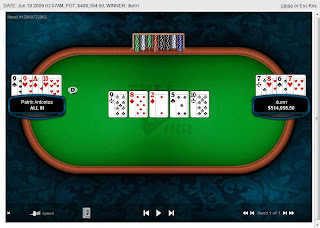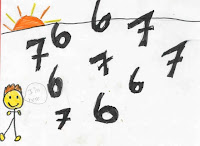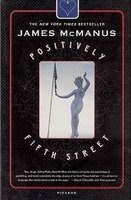Talking WSOP Main Event Final Table: ESPN Conference Call
 Had a very enjoyable conversation with Jim McManus yesterday, whose new book, Cowboys Full: The Story of Poker, has finally come out this week. I wrote a little something about the book here last week. I’ve also been invited to review it for a couple of other places, and my interview of McManus will additionally be appearing on a website near you -- not this one -- in the not-too-distant future. (More on that to come!)
Had a very enjoyable conversation with Jim McManus yesterday, whose new book, Cowboys Full: The Story of Poker, has finally come out this week. I wrote a little something about the book here last week. I’ve also been invited to review it for a couple of other places, and my interview of McManus will additionally be appearing on a website near you -- not this one -- in the not-too-distant future. (More on that to come!)We talked a lot about the new book, as well poker writing in general. I had a list of questions and got through just about all of them, although I noticed afterwards one question had gone unasked. Since McManus is not only a person who has studied World Series of Poker history, but has helped write it and, in fact, is part of that history himself (having made the WSOP Main Event final table back in 2000), I had meant to ask him his thoughts regarding the current state of the WSOP Main Event, in particular his opinion on the delayed final table. But we’d gotten onto other things and that one fell through the cracks.
As it happened, around the time I was chatting with McManus, ESPN was having a conference call with the media to talk about the upcoming final table, which finally will be getting started in just a little over a week. George McNeilly, Senior Director of Corporate and Consumer Communications for ESPN, moderated the call, with Lon McEachern and Norman Chad, the WSOP show commentators, and Doug White, the Senior Director of Programming and Acquisitions for ESPN, offering their thoughts and fielding the questions. I had a chance to listen to that call later on, thanks to our buds over at Pokerati.
Things began with McNeilly noting that there will be a live blog over on ESPN.com (kept by Andrew Feldman, I’m assuming), as well as a “poker pick’em” game with trivia questions about the final table. Chad noted early on that he was particularly focused on the storylines of Phil Ivey, Joe Cada (trying to become the youngest ME winner ever), and “the logger coming out of the woods,” Darvin Moon. Later on Chad would say the presence of these three players and their stories made this year’s FT the “most fascinating” for him “since we started doing it in 2003.” Later a reporter from The Washington Post tried to characterize these nine players as “one of the least charismatic groups you’ll ever see,” but both Chad and McEachern begged to differ.
The first questions concerned coaching -- it appears Jeff Shulman is the only one of the players thus far to have publicly acknowledged having hired a coach (Phil Hellmuth) -- and the effect of the delay. Then Stephen Murphy of Card Player asked an interesting question about that Phil Ivey hand aired earlier this week, the one in which Ivey mucked the winner at showdown.
 “My first reaction was somehow something was wrong with the tape,” said Chad, who called it “a stunning thing to see.” McEachern added that Ivey’s gaffe proved “this [kind of mistake] does happen even to the best, because the grind tests every fiber of a player’s mind and spirit.” They added that as far as they knew, Ivey may not have known he had made the mistake until the show aired this week. Would they ask him about it? Of course, said Chad, who guessed that Ivey would probably say “‘Thank goodness it didn’t happen in the Big Game.’”
“My first reaction was somehow something was wrong with the tape,” said Chad, who called it “a stunning thing to see.” McEachern added that Ivey’s gaffe proved “this [kind of mistake] does happen even to the best, because the grind tests every fiber of a player’s mind and spirit.” They added that as far as they knew, Ivey may not have known he had made the mistake until the show aired this week. Would they ask him about it? Of course, said Chad, who guessed that Ivey would probably say “‘Thank goodness it didn’t happen in the Big Game.’”Midway through the call they took a break to give summaries of all nine players. One interesting point made by Chad was the fact that of these nine, there are three players in their 20s, three in their 30s, and three in their 40s and 50s. McEachern said he favors Eric Buchman to win it all, and Chad said he thought Moon would not bully the table with his big stack but instead play it conservatively so as to guarantee himself a finish in the top four or five.
Dan Cypra of Poker News Daily asked about the pros and cons of a Moon victory, as well as that of an Ivey win. McEachern said there was “a huge upside for both players winning,” speaking particularly of a Moneymaker-like effect should Moon take it down. “The stuff of storybooks,” said Chad of a possible Moon victory, sort of echoing himself from earlier ESPN broadcasts. Near the end of the call, they talked a bit more about Moon and the fact that he has yet to accept any sponsorship deals. Chad suspects he will ultimately take a one-day deal and be wearing a logo of some sort at the FT, though thinks it would be cool if he didn’t.
Gary Trask of Casino City Media asked about the production of the final table and whether ESPN had learned anything from last year. “We heard our fans loud and clear,” said Doug White, adding that they were “hoping to show a little bit more of heads-up play” this time around. Along those lines, we also heard reports yesterday -- not in the conference call, but elsewhere -- that ESPN Senior Producer Jamie Horowitz is saying that ESPN is reserving the possibility of extending its programming on Tuesday night (November 10) beyond the scheduled two hours so as to show more of heads-up play.
Answering another question, White said he did think the ratings for this year’s final table would exceed last year’s, and he also intimated that the plan for 2010 will likely be to follow a similar schedule as we saw this year, with a lot of shows devoted to the Main Event (and not so many to the prelims).
There will be no preview show this year, but as McEachern pointed out “we’ve already introduced all of the players to America already” and so ESPN won’t be taking away from showing hands in order to bother too much with that during the final table show. There will be a feature on Phil Ivey next Tuesday night on ESPN’s “E:60” show (at 7:00 p.m. Eastern time).
Those were the highlights. Not too much in the way of news, really, and in fact, the only real news of the day didn’t come from the conference call, but in that report in which Horowitz said they might show more than two hours of coverage on November 10.
 I may well follow up with McManus to ask him his thoughts regarding the Main Event final table. I’m remembering that the year he made the ME final table -- 2000 -- where he finished fifth, Jeff Shulman also went deep, being eliminated in 7th. (The televised final table was six-handed that year, the last year before the switch to a nine-handed FT.)
I may well follow up with McManus to ask him his thoughts regarding the Main Event final table. I’m remembering that the year he made the ME final table -- 2000 -- where he finished fifth, Jeff Shulman also went deep, being eliminated in 7th. (The televised final table was six-handed that year, the last year before the switch to a nine-handed FT.) In any event, I’m sure that like the rest of us, he, too, will be curious to see how this next chapter of “the story of poker” plays out.
Have a good weekend, all.
Labels: *the rumble, 2009 WSOP Main Event, ESPN, Lon McEachern, Norman Chad




 .
. 
 . He thinks a moment, then raises to 1,000,000. Ivey (in Seat 1) leans forward and asks Smith (in Seat 9) what he has left. Smith says “six-and-a-half or six [million], something like that.”
. He thinks a moment, then raises to 1,000,000. Ivey (in Seat 1) leans forward and asks Smith (in Seat 9) what he has left. Smith says “six-and-a-half or six [million], something like that.” 

 , and both check. The turn is the
, and both check. The turn is the  , and again both check. The river brings the
, and again both check. The river brings the  . I’ll freely admit that when I watched this for the first time, my initial instinct was to think Ivey had let Smith catch up, as I was focused on an ace or nine coming. Of course, with the hole cards displayed on the screen for me, it was easy enough to see that the river had in fact given Ivey the flush and so his hand was still the best.
. I’ll freely admit that when I watched this for the first time, my initial instinct was to think Ivey had let Smith catch up, as I was focused on an ace or nine coming. Of course, with the hole cards displayed on the screen for me, it was easy enough to see that the river had in fact given Ivey the flush and so his hand was still the best. 





 . As I say, I was down a bit and wanted to play my double-suited rundown. Could’ve reraised, I suppose, but I figured my hand played well against multiple opponents and so I just called the extra three bucks.
. As I say, I was down a bit and wanted to play my double-suited rundown. Could’ve reraised, I suppose, but I figured my hand played well against multiple opponents and so I just called the extra three bucks.

 , which delighted me -- two pair, and an open-ender. Not bad at all. The turn was the
, which delighted me -- two pair, and an open-ender. Not bad at all. The turn was the  , which didn’t look so good, and when the river brought the
, which didn’t look so good, and when the river brought the  I assumed I was cooked. The cards were flipped over. RockyRococo somewhat surprisingly turned over
I assumed I was cooked. The cards were flipped over. RockyRococo somewhat surprisingly turned over 


 . He and I both ended the hand with two pair. And LtBradshaw?
. He and I both ended the hand with two pair. And LtBradshaw? 


 ! (Wrong about them aces, I was.) He’d backed into a straight and took the pot.
! (Wrong about them aces, I was.) He’d backed into a straight and took the pot.



























